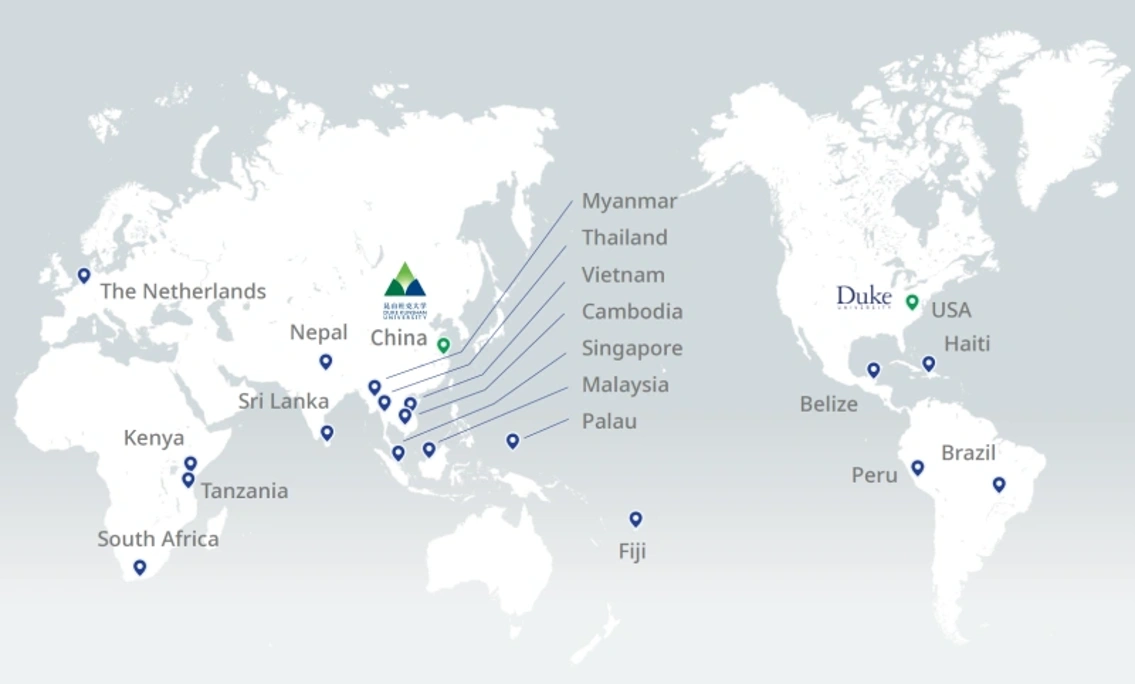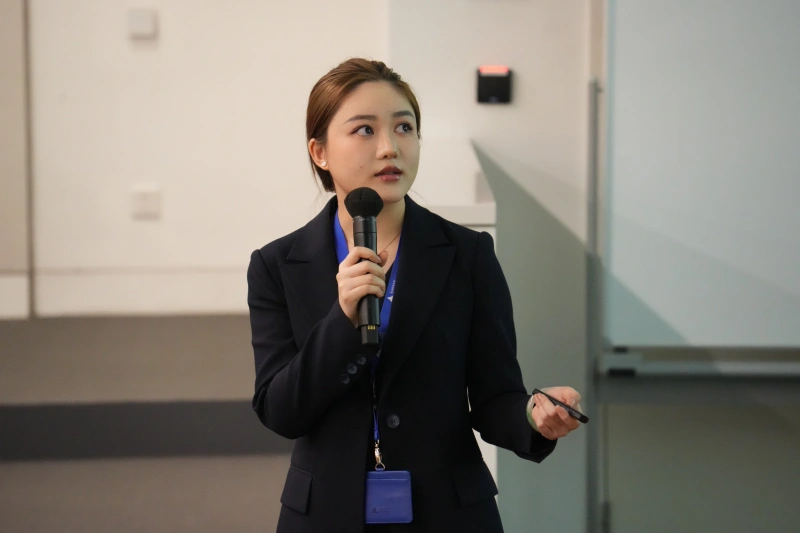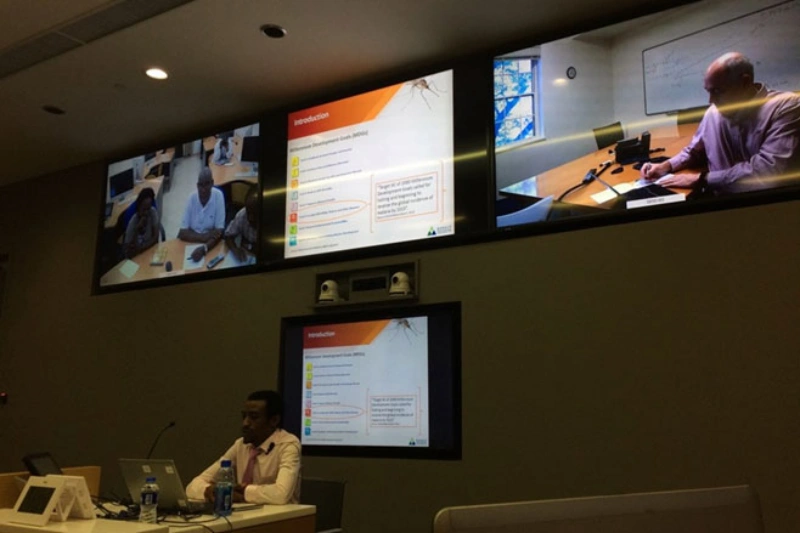
The MSc-GH program requires that students complete a minimum of 35 credits of coursework, and a minimum of 4 credits of ungraded research for thesis preparation, for a total of 39 credits. The eleven courses required by the program comprise six core and five elective courses. Students are encouraged to take more than five electives at no additional cost.
GLHLTH 700K Global Health Field Research: Planning and Skill Development
The goal of this course is to prepare students to successfully engage in field-based research in global health. Over the course of the semester, the class will meet weekly or biweekly to develop critical skills and reflective insights that can help students to manage the multiple aspects of fieldwork. In addition, monthly seminars will be held in the fall semester preceding the spring semester on selected topics.
GLHLTH 701K Global Health Challenges
The course provides an overview of the most important global health problems and the solutions advanced to address them. The first part of the course provides a theoretical foundation by examining the social determinants of health and the cultural embeddedness of global health. The second part is dedicated to health challenges, including infectious diseases, chronic diseases, mental health, disasters and complex humanitarian emergencies, injuries and violence. The third part discusses health systems, global health actors, and global health cooperation. The course is theoretically informed and practically-oriented, using case studies to illustrate the complex issues in the global health arena. Students are encouraged to reflect upon current global health threats; evaluate policies, programs, and interventions; and develop solutions to address health challenges.
GLHLTH 702K Global Health Research: Design and Practice
This course provides a foundation in study design, research question development, field implementation, measurement, validity and reliability. Quantitative and qualitative research approaches are examined. Students build critical skills in reading, interpreting and synthesizing scientific literature. The selection of appropriate measurements and survey development is emphasized and issues in field implementation explored.
GLHLTH 705K Biostatistics and Epidemiology for Global Health I
This is a core course in the MSc-GH program that introduces students to statistics and epidemiology as applied to research and practice in global health. Through a series of real-world examples, you will develop a fundamental understanding of statistics and epidemiology, and learn how to design, describe, manage, analyze, and present data from various epidemiological studies. This course will emphasize the importance of quality study design and data analysis, including data visualization, to evaluate research questions.
In addition to lectures, this course includes a weekly lab session to teach students how to apply basic and intermediate epidemiological and statistical methods and concepts using Stata. Each lab session includes a combination of handouts, software demonstrations, and hands-on practice. Students will become familiar with data management, manipulation, analysis, and presentation (numerical and visual) using Stata.
GLHLTH 707K Biostatistics and Epidemiology for Global Health II
This is an intermediate-level course that builds upon the foundations of Biostatistics and Epidemiology for Global Health I, expanding on concepts of epidemiological reasoning, and the design and analysis of research in population health sciences. Topics include confounding, bias, misclassification and measurement error, reliability and validity, missing data, power calculation, survival analysis, and meta-analysis. In addition to lectures, this course includes a weekly lab session with the goal of teaching students how to apply basic and intermediate epidemiological and statistical methods and concepts using Stata. Each lab session includes a combination of handout, software demonstrations, and hands-on practice. Students will become familiar with management, manipulation, analysis, and presentation (numerical and visual) of data using Stata.
GLHLTH 740K Ethics for Global Health
This is a required course for the MSc Global Health. The course examines some of the most important ethical challenges surrounding global health research and practice, including the tension between universalism and ethical relativism, the challenges of cross-cultural partnerships, and the norms of ethical research conduct. The second part of the course is organized around several global health topics, analyzing the ethical dimension of problems and interventions. The lectures will be complemented by seminar activities (e.g., case studies, student presentations, etc.) that apply the theoretical knowledge to actual or hypothetical situations.
GLHLTH 750K Health Systems in Developing Countries
This course will discuss the main problems and challenges in the development and strengthening of different health systems in developing countries. It will introduce the frameworks and approaches developed by WHO, World Bank, and leading academics to analyze health system issues and problems arisen over the past decades. It will also provide opportunities to discuss and analyze challenges and opportunities for improving the performance of health systems for better health in various health system contexts. The course will be conducted in an interactive format, with a combination of lectures, case study analysis, and group exercises/discussions. Active participation of all enrolled students is anticipated.
GLHLTH 571K Introduction to Maternal and Child Health
This course will provide a solid foundation in global perspectives on maternal and child health research, practice and policy. The course will introduce global trends in maternal and child mortality, equity in maternal and child health and global strategy for improving their health and well-being. It will provide opportunities of discussing and analyzing critical health challenges facing women, children, healthcare providers, and policy makers, particularly in low- and middle-income countries. The course will be given in an interactive format through a combination of lectures, case study analysis and group exercises/discussions.
GLHLTH 641K Non-Communicable Diseases in LMICs
This course provides a global overview of recent (mid-20th century to present) trends in non-communicable disease (NCD) epidemiology and strategies for prevention and control of these diseases, with particular emphasis on China and comparisons between China and other countries. Focuses on four major NCD categories as separate modules: cardiovascular, diabetic, oncologic, and pulmonary diseases. Uses case studies to highlight selected geographic differences. Provides firm understanding of shifting disease burden, stakeholders, and interventions to address NCDs in low- and middle-income countries. Designed for graduate-level students, open to advanced undergraduates.
GLHLTH 772K Qualitative Research Method
The course provides an overview of qualitative methods and equips students with the knowledge and skills to apply qualitative methods in global health research. The first part of the course examines the similarities and differences between qualitative and quantitative methods and the opportunities to combine them in mixed methods research. It also provides an overview of the qualitative research design. The second part is dedicated to qualitative data-collection instruments (interviews, focus groups, observation, and document analysis) and methods (e.g., ethnography). The third part focuses on data analysis and interpretation in basic qualitative research and grounded theory. The course combines lectures and practical activities, immersing students into the qualitative research process.
GLHLTH 751K Implementation Science
Implementation science provides a basis for the context-specific, evidence-informed decision-making needed to make what is possible in theory a reality in practice. It requires engagement of a wide range of stakeholders and draws on multiples disciplines to address complex implementation challenges. It is an emerging discipline with increasing importance in global health and health research for translating evidence into practice and maximizing the impact of health interventions. This course will provide an overview of implementation science, introduce theories of change and approaches and methods for implementation research. It will also discuss the implementation strategies, assessment and application of implementation science in health relevant areas. The course will be conducted in an interactive format, with a combination of lectures, case study analysis, and group exercises/discussions. Active participation of all enrolled students is anticipated.
GLHLTH 755K Health Economics
Health economics is an active and growing field that concerns the production and consumption of health and health care. Theoretical and empirical findings by health economists have guided government decision making about resource allocation and health policies. It is critical that professionals across the entire health sector to understand the economics that power the healthcare market.
The goal of the course is two folded. One is to enhance students’ understanding of the key economic concepts and theoretical models that are widely used to analyze heath economic issues from both the demand and supply sides. The second is to provide students with the basic ability to evaluate and interpret empirical findings from popular econometric methods. For instance, interrupted time series, difference-in-differences, regression discontinuity design, etc. Reflecting the increased interest in global health, this course takes a global view in the sense that the analysis is not country-specific, but applies to countries all over the world. Recent research findings from the US, China, and other major developing regions will be involved in class discussions.

All MSc-GH students must complete a mentored, minimum 10-week field-based research project. The fieldwork component of the MSc-GH was designed with the goal of having students engage in research with populations affected by the challenges of global health disparity. The fieldwork experience forms the basis of the master’s thesis, which is the culminating product of the MSc-GH.
Historically, our students have explored more than 20 countries/regions across six continents for their field studies.

Working closely with a Duke Kunshan faculty mentor, students will design and implement an original research project to address a global health research question, conduct fieldwork over at least ten weeks, and write a thesis reporting on their original work. There are several models for doing this:
Students will receive funding to support the fieldwork experience, provided they submit appropriate documentation on time to Duke Kunshan Global Health Education Program Office in support of their project.
The master’s thesis is the culminating product of the MSc-GH. The thesis must be formatted consistent with the requirements of the Duke Graduate School. In general, the thesis should:
Check the collection of masters theses by DKU Global Health Master of Science Program at https://hdl.handle.net/10161/2493.
All candidates are required to have a final thesis defense with their thesis committee. Students will work with their Research Mentor/Committee Chair and thesis committee throughout the thesis writing process to determine when the paper is ready to be defended, making sure to allow ample time for review and revisions, considering the Graduate School deadlines.
In preparation for the thesis defense, there are several key deadlines for students and mentors to meet. Close communication between student and mentor, as well as with program staff and leadership, is important to ensure that all requirements are met. Many of the requirements in the final semester are monitored by the Graduate School, which is very firm on deadlines.
The Graduate School allows for thesis defenses to occur whenever classes are in session (i.e., during the academic terms but not during Spring break, the exam period, etc). Firm deadlines are established in advance for each academic term and should be considered a last opportunity: that is, meeting deadlines well in advance is encouraged.
Committee members including the chair of the committee may participate remotely. Duke Kunshan must submit names of any remote participants to the Graduate School for approval in advance, so it is important to communicate with program staff as early as is possible if one or more members will participate remotely.




Students from Master of Science in Global Health at Duke Kunshan University have been getting an authentic Duke experience by one semester at Duke University. They spend their third semester on campus in Durham, North Carolina.
Ever wondered what it’s like to be a student at Duke University? Join Ema Hsiao, a dedicated MSc-GH student from DKU, as she takes you on a personal journey through her daily life at Duke. From bustling campus activities to insightful academic experiences, this video shows you student life at Duke.
Interested in what courses offered at Duke University look like and how to choose best courses for you? Watch the next video made by our students!

© 2025 Duke Kunshan University 苏ICP备16021093号